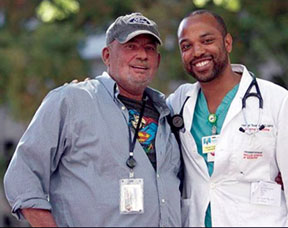 Fighting HIV in Miami, one dirty needle at a time
Fighting HIV in Miami, one dirty needle at a time
Jose De Lemos, 53, and Hansel Tookes, M.D., a University of Miami medical resident, outside of Jackson Memorial Hospital after a recent visit. De Lemos, who has HIV, is being treated by Tookes.
PART I OF III
MIAMI, FL — The doctor on a mission met the homeless heroin addict who lived under a tree last year at Jackson Health System’s special immunology clinic when both men were struggling to overcome the odds.
Jose De Lemos, infected with HIV and hepatitis C from a shared needle, had gone without treatment for almost a year. He’d dropped 80 pounds, suffered from night sweats and a rash on his leg and chest. Even walking hurt.
He was in no mood for conversation with a well-meaning doc.
But Hansel Tookes, a University of Miami doctor with a degree in public health and a calling to public service, isn’t the kind of doctor who is easily put off. He talked to De Lemos any-way. Sent him to dermatology, started him on meds for HIV and hepatitis C, worked to find him a bed in rehab, and talked — about his own uphill battle to create a syringe exchange program in South Florida, the kind of program that might have prevented De Lemos’ infection.
A public health advocate in Miami, where new HIV infection rates consistently top the state and national charts, Tookes had been struggling for years to get a bill passed in the Florida legislature to create a program in Miami-Dade County to help end that terrible distinction.
In that time, he had gone from medical student to doctor. Testified before legislative committees over and over. And learned just how hard he would have to fight to get what he considered a very modest proposal to save lives and improve public health through a conservative, Republican-dominated legislature.
For De Lemos, his doctor’s commitment to the cause — an unpopular one, at that — was a revelation: “I’m hard-headed. And he’s persistent. He’s like, ‘If you get clean, you can talk a-bout this. You’ll be great. … You can help me.’ I admire him because he went through a lot but he kept going.”
Tookes recalled a different moment with his patient: “He started crying because he said he didn’t know people cared.”
For the next eight months, as De Lemos kicked heroin, endured a skin condition that caused blisters across his entire torso and finally saw his sky-high viral count drop, Tookes started seeing hope, too. His proposal, which had been stalled for years, started gaining traction. The nationwide heroin epidemic had changed the dialogue about blood-borne diseases. De Lemos’ appointments with Tookes now usually included an update on the needle exchange bill in Tallahassee. Sometimes, when there was a big vote, Tookes played video recordings of the committee meetings on his phone for De Lemos to see.
“The reception in the ER isn’t great. I had to prop the door open,” Tookes said, with a laugh. “But we watched.”
In March, a full five years after Tookes published a study in a medical journal when he was still a student that documented the harsh reality of illicit needle use in Miami, Gov. Rick Scott signed the Miami-Dade Infectious Disease Elimination Act (IDEA), making Miami-Dade’s program the first legal needle exchange in the American South.
The victory didn’t mean his fight was over. Legislators weren’t unanimous when they approved the bill, and IDEA reflects that. It creates a five-year test program, only in Miami-Dade and without any public financing. Tookes and UM, which will run the program, must raise all the money for the program privately, through grants and donations. Tookes — doctor, public health advocate and needle exchange crusader — must now also be-come a fundraiser.
He’s undaunted. His determination has carried him this far, and he is already envisioning the rest.
“When I flew back to Miami after the bill had passed, I looked at the city as we were landing at MIA and I thought, what we just did is going to change the health of tens of thousands of people,” Tookes said. “And that was an amazing feeling. And that’s an amazing truth. And that’s where we are.”
